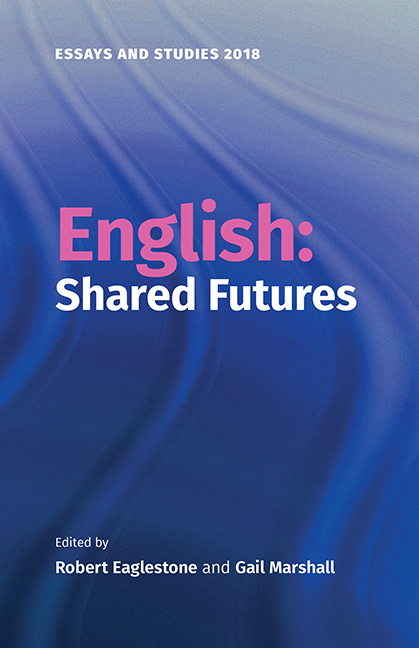Book contents
- Frontmatter
- Contents
- Notes on Contributors
- Acknowledgements
- Abbreviations
- Introduction
- The Changing Picture of School English
- From A-Level to HE: Working Towards a Shared Future?
- English Outreach: Academics in the Classroom
- From Provider to Stager: The Future of Teaching English in HE
- Pedagogic Criticism: An Introduction
- Exquisite Tensions – Narrating the BAME ECA Experience
- Postgraduate Futures: Voices and Views
- Shared Futures: Early Career Academics in English Studies
- Some Reflections on the Funding of English Departments
- English: The Future of Publishing
- Digital Futures
- A View from the United States: The Crisis in the Humanities; the Liberal Arts; and English in the Military Academy
- The Future of Borders
- ‘Between and Across Languages’: Writing in Scotland and Wales
- Exploring Intersections between Creative and Critical Writing: An Interview with Elleke Boehmer
- Integrating English
- Employability in English Studies
- Creative Living: How Creative Writing Courses Help to Prepare for Life-long Careers
- Practice at Large: How Creative Writing can Enhance University Research Environments
- ‘And who can turn away?’ Witnessing a Shared Dystopia
- English and the Public Good
- ‘Can Wisdom be put in a silver rod? / Or Love in a golden bowl?’ On Not Defending the Humanities
- ‘Something Real to Carry Home When Day Is Done’: The Reader in Future
- Afterword
- Index
Practice at Large: How Creative Writing can Enhance University Research Environments
Published online by Cambridge University Press: 15 October 2019
- Frontmatter
- Contents
- Notes on Contributors
- Acknowledgements
- Abbreviations
- Introduction
- The Changing Picture of School English
- From A-Level to HE: Working Towards a Shared Future?
- English Outreach: Academics in the Classroom
- From Provider to Stager: The Future of Teaching English in HE
- Pedagogic Criticism: An Introduction
- Exquisite Tensions – Narrating the BAME ECA Experience
- Postgraduate Futures: Voices and Views
- Shared Futures: Early Career Academics in English Studies
- Some Reflections on the Funding of English Departments
- English: The Future of Publishing
- Digital Futures
- A View from the United States: The Crisis in the Humanities; the Liberal Arts; and English in the Military Academy
- The Future of Borders
- ‘Between and Across Languages’: Writing in Scotland and Wales
- Exploring Intersections between Creative and Critical Writing: An Interview with Elleke Boehmer
- Integrating English
- Employability in English Studies
- Creative Living: How Creative Writing Courses Help to Prepare for Life-long Careers
- Practice at Large: How Creative Writing can Enhance University Research Environments
- ‘And who can turn away?’ Witnessing a Shared Dystopia
- English and the Public Good
- ‘Can Wisdom be put in a silver rod? / Or Love in a golden bowl?’ On Not Defending the Humanities
- ‘Something Real to Carry Home When Day Is Done’: The Reader in Future
- Afterword
- Index
Summary
‘I don't at all favour the institution known as the “creative writer on the campus”,’ opined F. R. Leavis in 1967. ‘What next?’ linguist Roman Jakobson remarked, when he heard Vladimir Nabokov had been offered a Harvard professorship, ‘shall we appoint an elephant to teach zoology?’ Like King Cnut, their helplessly raised hands failed to hold back the tide. Creative writing (hereafter CW) maintains an uneasy relationship with its academic mother subject, English, ‘rather like welcoming Heathcliff into the family’, in Nicholas Royle's British ‘elephant’ equivalent. Beyond this uncomfortable duality as academic sub-discipline and object of study, however, Royle recognizes that CW attracts students, connecting its rapid expansion in many minds to the marketization of Higher Education.
A success story, yet often eyed still with suspicion then, CW has gradually carved out a distinct academic identity for itself. This essay outlines the subject's genesis within English Studies, and describes the ways it has come to describe its own research paradigms. It considers how the subject is currently securing its future in Higher Education. We discuss how the University of Leicester's CW research centre, the Centre for New Writing, has adapted to the wider academic research environment. Notwithstanding the subject's business value to institutional managers, we show how it provides many opportunities, both to serve the wider writing community, and to design innovative research projects with colleagues from other disciplines. Archaeologists, archivists, historians, geographers and medical researchers are awakening to the power of imaginative writing and beginning to understand its potential for delivering considerable public benefits.
Understanding ‘Creative Practice’
Sociologist Laurel Richardson ‘was taught … not to write until I knew what I wanted to say’; instead, she finds ‘I write in order to learn something that I did not know before I wrote it.’ The late author and screenwriter Alain Robbe-Grillet believed the
function of art is never to illustrate a truth – even an interrogation – known in advance, but to bring into the world certain interrogations not yet known to themselves… When we ask [the writer] why he has written his book, he has only one answer: ‘To try and find out why I wanted to write it.’
- Type
- Chapter
- Information
- English: Shared Futures , pp. 171 - 179Publisher: Boydell & BrewerPrint publication year: 2018



